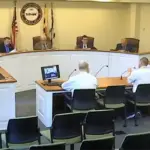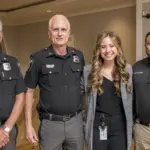by Linda L. Esterson, photography by Nikola Tzenov
How three local families chose a path of helping others to heal from the trauma of substance abuse and addiction.
Thirty-two people overdosed, four fatally, in Carroll County in July this year. One-third of the overdoses were attributed to fentanyl.
According to the Carroll County Sheriff’s Department’s Overdose Investigative Summary Report, as of Aug. 1, there have been 122 accidental overdoses, 42 suicide attempts and 32 fatalities over the same time. Sixty-seven overdoses were attributed to fentanyl, 37 to prescription medications and another 44 to unknown drugs. The good news is that the Maryland Opioid Operational Command Center reported a 7.3% decrease in fatal overdoses in Carroll County in the 12 months ending in April 2022 as compared to the previous year. The obvious bad news is that people are still overdosing and people are still dying.
But there is hope.
Living among us are people who have survived the devastation of substance abuse, either personally or as a family member, and have committed to fighting addiction head-on. They have endured the unimaginable and have chosen a path to help others. Focused on education and guidance, the three stories that follow detail the work of individuals who devote each day to helping others in their recovery from substance abuse.
Rising Above Addiction — Tammy Lofink
Rob Lofink had just graduated high school, secured a job and registered for college courses when he succumbed to an overdose while at home in Sykesville. The autopsy found opioids in his system and revealed needle marks between his toes.
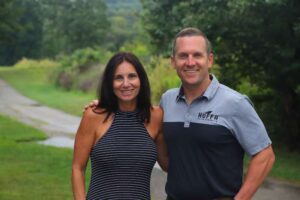
“I had no idea of the depths of the addiction,” his mother, Tammy Lofink, said. “I knew his behavior was more severe than most teenagers. When we sent him away [to rehab], I just naively thought that … everything’s going to be good.”
Following Rob’s death, Tammy sat on her front lawn, profoundly aware that her life had changed forever. She knew that she needed to do something to help herself, but also needed to assist families and individuals struggling with addiction. That was the genesis of Rising Above Addiction, the nonprofit organization she founded in September 2015 for — and in memory of — Rob.
Initially, Rising Above Addiction raised money to help individuals. It developed into a community partner with the State’s Attorney’s Office, the Carroll County Health Department and the Sheriff’s Department. An annual golf tournament, 5-mile run, music festival and cornhole barbecue led to work with the Carroll County Drug Court and ultimately the opening of a sober home for girls and women “struggling with addiction who deserve a chance to get better.”
Reclaiming My Life opened in Westminster in 2017. A photo of Rob hangs at the entrance as inspiration. A second house, Keeping My Serenity, opened in 2019 honoring Kristin Marie Spurrier, a local girl who also passed away following substance abuse. Her photo, too, appears in the doorway to remind the women that “every choice they make can be life or death,” Tammy says.
“I call it my recovery from losing Rob, being able to help these women start their lives over again,” she explains. “My main goal of the sober home is to have each woman walk through the door and feel like they’re at home. They’re safe. And they’re surrounded by people who will help them get their lives back.”
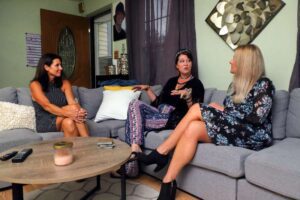
Weekly house meetings and group and individual sessions with licensed therapists provide guidance for the eight residents of each sober home. After the first two weeks, the women are required to pay a modest rent, perform daily chores and secure employment. There’s also regular drug testing and a policy based on honesty and safety. If they relapse, they go for treatment and can return if honest about their relapse. A house manager resides on-site to ensure all women participate and adhere to the house rules. One former resident became a house manager and today assists in the operation of both houses. The woman met her wife through the house and they’re having a baby, whom they plan to name after Rob.
“Just seeing all of the life that has come out of my son’s death, it’s both beautiful and tragic at the same time,” Tammy says.
Continuing her healing journey, and in the hopes to help others find strength following a loss due to substance abuse, Tammy penned Reclaiming My Life, The Book. Published in 2020, it details Rob’s addiction and her journey of loss and healing. The book concludes with some letters she wrote to Rob on his birthday and death anniversary.
In April, Rising Above Addiction purchased the Reclaiming My Life house and plans to also purchase a property two doors away to relocate Keeping My Serenity. Tammy dreams of a day when Reclaiming My Life house is paid off and that all fundraising can support Rising Above Addiction to directly help the women in the county battling substance abuse.
“It’s about healing, because everything we do is for Rob now,” Tammy says. “I love these girls so much and they always thank me but they have helped me in more ways than I could ever help them. I’m more than happy to do it to keep them safe.”
The HOFFA Foundation — Tom Herb
The last time Tom Herb saw his brother, Jimmy Zumbrun, was the morning he said goodbye.
Tom leaned over Jimmy’s casket at the family business, Jeffrey N. Zumbrun Funeral Home, in Eldersburg. It was their last “breakfast” together, in tribute to the family tradition shared with their parents, Connie and Jeff Zumbrun. Their older brother, Tim Herb, had placed a coffee mug in Jimmy’s hand in the casket.
Jimmy was prescribed painkillers after a car accident, and that snowballed into addiction. He had a bed reserved at rehab and used it one last time in the summer of 2019. According to the autopsy report, the substance he chose included fentanyl, a strong synthetic opioid that is a major contributor to overdoses.
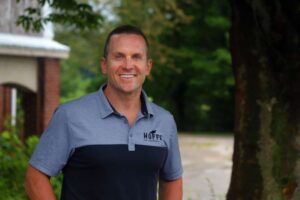
Tom struggled for a way to keep his brother’s spirit alive. He reflected on the connection they shared over coffee. That’s when he knew.
Tom started a coffee business, with the proceeds directed to organizations that fight addiction. He found a supplier and a graphic designer, and within 45 days of his brother’s death, the HOFFA Foundation — Healing Opportunity Free From Addiction — was born.
In the fall of 2019, HOFFA Beans launched out of the funeral home’s basement in advance of the holiday season. About 2,000 pounds of coffee shipped to customers in 25 states. Local deliveries of up to 15 miles were made, complete with a hug of gratitude from Connie.
“It wasn’t so much about the coffee itself,” Tom says, “it was about the mission and the impact we could make. We all know that addiction impacts just about everyone out there. It doesn’t discriminate.”
As the coffee business grew, Connie and Tom created Jimmy’s Hometown Blend, and the packaging was redesigned with the Maryland flag. Its success spurred their realization that the coffee was a vehicle to something greater.
The HOFFA Foundation expanded to include a board of directors composed of several of Jimmy’s family members and others who see addiction through different lenses, Tom says.
“We have people on our board that are either in recovery themselves, have kids in recovery or experienced loss like us,”
he explains.
At the first board meeting, in January 2021, they decided to make a bigger impact in Carroll County. By April, property was purchased for a sober home, and in July, the house manager moved in to the HOFFA House, designed to guide men on a path to recovery and become productive members of society. The first house manager transitioned out of the house this past July and is now the organization’s first full-time employee, overseeing the house but also working on community connectedness.
Connie and board members visit regularly and have dinner with the residents on Monday evenings. They discuss the highs and the lows, and their goals. Community members periodically attend to provide educational lectures.
Policies and procedures, naturally, promote accountability. Many have failed attempts at other sober houses, and they embrace the culture and structure of the HOFFA House.
Tom anticipates opening one or two more sober homes in the county, based on recognized need. But the organization also strives to create opportunities for those in the recovery community.
A year ago, the organization took first place in the Carroll Business Challenge for its concept of “HOFFA Beans and Biscuits,” a community food trailer that will offer coffee and biscuits, serving as a “mobile billboard” centered around “breaking the stigma” of substance abuse and recovery. Those in recovery will have the first opportunity to work on the truck. Talks are underway with community businesses to provide sponsorships prior to the October launch.
“We’re occupied with a purpose,” Tom says. “It helps us as family members, who lost a loved one near and dear, [to] feel good every day knowing what we’re doing to help the community. It’s always fueled by passion and the willingness to help others so they don’t have to lose their brother, their son, their uncle.
“No one wants to be in our club. … We can prevent others from going down this path.”
Carroll County State’s Attorney’s Office — Tim Weber
The summer before he entered high school, Tim Weber drank his first beer. The effects numbed him from the trauma and uncertainties in his life: the death of his mother three years earlier, living with his strict father, and a stepmother soon to enter the family.
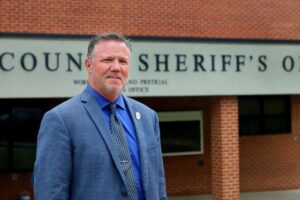
That started his path down a long, dark road. Alcohol progressed to harder drugs like heroin and crystal methamphetamine. After his first year in college in Texas, where he was born and lived before moving to Maryland, he dropped out, then fathered two children. He ultimately spent more than a dozen years either in jail, homeless or on the streets in Texas or in Maryland, where he returned in 2000.
He was in and out of rehab 18 times, ranging from three days to two years. At a Texas sober house, he met Isaiah Robertson, the inspirational owner who instilled in Tim the need to help other people in their recovery.
“I needed to fall in love with helping other people more than using,” Tim says.
In October 2002, he was awakened by paramedics who had revived him, but he declined help. A month later, in Baltimore, as he bought heroin and cocaine, he flashed back to the look on his father’s, his kids’ and his girlfriend’s faces. Each time he let them down.
“I couldn’t shake the look,” he says. “I couldn’t down enough drugs to get rid of it.”
That’s when he went to Howard County General Hospital, promising to get cleaned up, adhere to the rules and not miss any therapy sessions. He entered a sober home in Baltimore, and started helping others. He got a job, paid his rent and attended 12-step recovery sessions. Then he got a job at a flower shop, got a car and provided rides to meetings for others in recovery.
That led to the purchase of a flower shop, which he and his wife, Kathy, still own today. He had the freedom to do what he needed — to help others — and that led to speaking engagements in the community.
After five years sober, he wrote his first book, Gutters and Roses, chronicling his childhood and life with drugs.
“The book opened the floodgates for me to help,” he says.

In January 2009, he opened Weber Sober Homes, the Joey V. House, named for his high school best friend who died from addiction, and Stonewall House, after his cousin who committed suicide following alcohol abuse.
That led to his true calling. In 2015, the state’s attorney created a community education liaison position for Tim to help navigate people into treatment after overdose.
“It was forward-thinking,” Tim says. “[The state’s attorney] realized we were just arresting people and putting them in jail and not helping the opioid crisis.”
In collaboration with Carroll County Public Schools and the Carroll County Health Department, Tim created a program for eighth- to 12th-grade students, not just telling them to “say no to drugs,” but exposing them to people who have come out of substance abuse and addiction.
“We teach younger kids refusal skills and how to get themselves out of situations that can lead to disruptive behavior,” he says. “It’s not only substance abuse but [also] smoking and vaping.”
Tim is also involved with Camp Thrive for children with addiction-related trauma, whether a parent is dying, incarcerated, or actively using at home.
“It’s the most impactful thing I do,” he says. “It just unites these kids to be available to open up and talk and understand that they’re not the only ones going through it.”
Each day, he remains fulfilled by his job and thankful that life has given him another opportunity with Kathy and their son, Declan, and his older children. He works to provide that same opportunity to others who are following a path similar to his.
“There’s not any person I would give up on,” he says. “I think anyone can recover and have a life like I have.”








